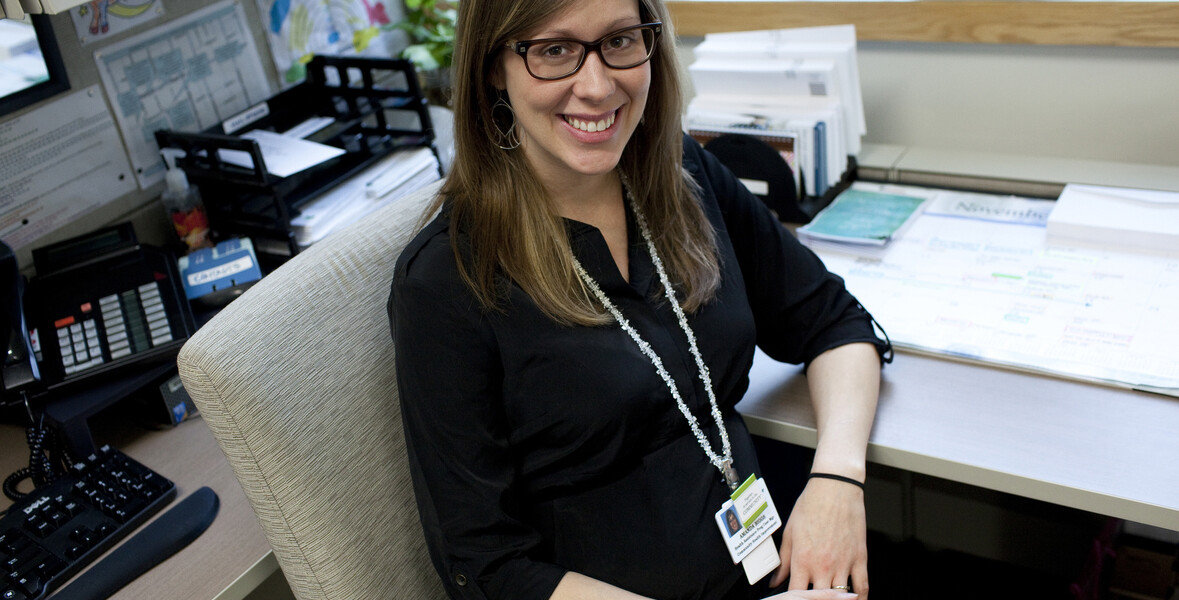By Carolyn Shapiro
On a Friday afternoon in early December, Cary Jewkes was busily arranging cubicle walls in the Given Courtyard atrium at the University of Vermont College of Medicine.
The next day, 72 medical school applicants were due to arrive for their admissions interviews. In makeshift cubicles, they would be sitting down with nine different interviewers, spending just six minutes with each to answer a single question.
The process is known as multiple mini-interviews, or MMIs, which compile the evaluations of several interviewers of a single candidate. Starting in 2014 as part of the admissions process for the Class of 2019, the College switched from its traditional one-on-one interview format each applicant meeting with a single interviewer for 45 minutes—to the MMIs.
This collection of assessments provides the College with a more complete and less biased picture of a prospective medical student than the opinion of a single interviewer, says Jewkes, the College’s assistant director of admissions.
“If they clicked with their interviewer, they did really well,” she says of applicants under the old format. “But if they didn’t click with their interviewer, that one person” could destroy their status as a candidate.
Callie Linehan of the College’s Class of 2019 is among the first medical students who went through the MMIs and says she loved the experience.
“I just felt it gave everybody the fairest shot, because everybody has a chance to connect with somebody,” she says now.
The fast interviews posed a challenge, she admits, but she approached them as a sort of mental game of spontaneous problem-solving.
“It was really fun,” Linehan says. “Compared to the one-on-one interviews I had, it was really intellectually interesting.”
McMaster University in Ontario, Canada created the MMI format. Studies since then have shown a correlation between a medical student’s success at the multiple-interview process and success during clinical rotations and, later, residency, Jewkes says, which makes sense to her. “You’re interacting with a lot of people really quickly.”
MMI at The University of Vermont
The MMI interviewers include members of the College’s faculty, current students and members of the Burlington, Vt.-area community. Each interviewer asks one of the closely-guarded questions that the College purchased from McMaster (examples are available online here). Then, the interviewers use a scoring system to evaluate each applicant’s answer.
“Adopting this new interview format was never about getting ‘better’ students, because we’ve always had great students,” Jewkes explains. “It was about providing an opportunity for prospective students to show us something we couldn’t see on paper.”
Class of 2019 student Gregory Gause agrees.
“It’s easier to tackle a problem than to talk about why I’m great for 45 minutes,” says Gause regarding the MMI format. “It felt more natural to me: Here’s a problem I might encounter and here’s how I’d solve it. I can see how you’d get a better view of the individual.”
The Admissions Office will host three more Saturday MMI sessions through February 2016 to close out the Class of 2020 admissions cycle. The August start was earlier than in the past, so UVM could catch candidates before they accepted placements at other schools. Since August 2015, 467 prospective students have gone through the MMIs, a large chunk of the 600 to 650 the College will typically invite.
“Getting the really strong people here as early as possible means increasing our chances of having a really strong class, and that’s the goal,” Jewkes says. “As far as the Class of 2020 is concerned, we are very excited and think we have the foundation of another great group of students!”
-Carolyn Shapiro is a freelance writer.
This article was originally published by the UVM College of Medicine.





